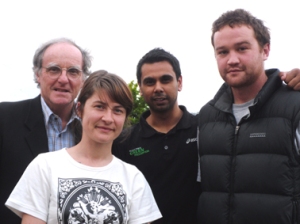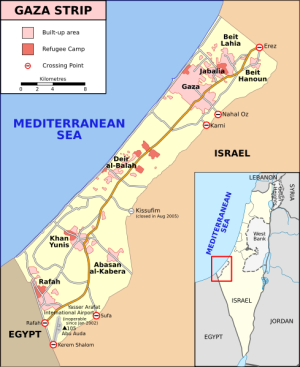
Youngsters in Gaza give the “V for victory” salute to Kia Ora Gaza convoyers in June 2012, showing the unbreakable spirit of Palestinians in the besieged strip
by Grant Morgan
editor of kiaoragaza.net
21 September 2012
After five years of besieging Gaza, Israel yesterday announced the first significant easing of the Zionist state’s near-total export ban imposed on the Palestinian territory in 2007 after Hamas won election and took power.
This turnaround amounts to an admission that Israel’s blockade of Gaza is facing defeat, leaving Tel Aviv casting around for an alternative mechanism of control over the battered enclave.
Khatib Mansour, director of the Israeli army’s Coordination & Liaison Administration for Gaza, said Israel would allow:
-
furniture and clothes to be exported from Gaza to the West Bank,
-
ten refrigerated trucks for transporting Gaza’s farm produce to enter the strip, and
-
the World Food Programme to transport 1.2 million fortified date bars made in Gaza to West Bank schools.
After five years of blocking virtually all construction materials from coming into Gaza, Israel has approved the entry of materials for 16 road and school projects sponsored by international aid organisations, Mansour stated.
And Gaza will be allowed to import other goods currently blacklisted by Israel, he reported.
The Israeli official said export and import restrictions would continue to be eased as long as border violence with Gaza militants remains under control.
Just the day before Mansour’s announcement, Gaza had come under missile fire from Israel’s military, who claimed the killing of two “terror operatives” in al-Janeneh.
And the month before had seen one of the worst spikes in cross-border hostilities since Tel Aviv’s 2009 invasion of Gaza, with dozens of Palestinians killed and injured in a barrage of Israeli missiles, and dozens of homemade rockets fired back by Palestinian resistance groups, to little effect.
So it seems implausible to suggest, as Mansour does, that the easing of Israel’s blockade on Gaza is connected with an abatement of cross-border hostilities.
Mansour’s announcement came four days into a lengthy visit to Cairo by a top-level Hamas delegation.
In the Arab world’s greatest city, Gaza’s premier Ismail Haniya formally requested Egyptian prime minister Hisham Qandil to authorise a free trade zone at Rafah, on their common border. It follows informal talks between Gaza and Cairo about breaking Israel’s siege, begun soon after the landmark election of Egyptian president Mohamed Morsi on 24 June.
Rafah, Gaza’s only border crossing not controlled by the Israeli military, is at present unable to handle the passage of goods. In late August, Morsi’s administration permanently opened Rafah six days a week for Palestinians to exit and enter, a major breach of the Israeli siege which had been enforced by Egypt’s former dictator Hosni Mubarak. That was followed by a fuel transfer from Egypt to Gaza’s power station to alleviate blackouts in the energy-starved territory.
Since the ousting of Mubarak in February 2011 by an Arab Spring revolution, and the sacking of his top generals and spies last month by Morsi, the gates of Egypt – and thus the world – have been opening to Gaza.
‘Egypt will stand by Gaza,’ Morsi told Haniya in a phone conversation on 19 August.
Once Cairo authorises a free trade zone, on top of Rafah’s opening to travellers and Egypt’s energy transfers to Gaza, then Israel’s long siege of the Palestinian enclave will have been comprehensively broken.
Tel Aviv can see defeat looming for its Gaza siege strategy, and in response is significantly easing the Israeli blockade. Why? The Zionist state appears to be experimenting with a strategic shift away from outright containment, which is failing, towards controlled opening, where Israel sets the rules for Gaza’s re-entry to the world.
The World Bank says Gaza’s economy cannot fully recover until access to traditional markets in Israel and the West Bank is restored. Tel Aviv seems to be counting on Israeli-regulated access to these markets as a new mechanism to control Gaza’s Palestinians.
A similar mechanism of Israeli economic and political control over Palestinians in the West Bank was enshrined in the 1993 Oslo Accord.
Recent weeks have seen mass protests and union strikes in the West Bank against the Accord’s economic and political enslavement of Palestinians. In response, Palestinian president Mahmoud Abbas last weekend said it was time to consider cancelling the Oslo Accord, a remarkable turnaround by a longtime supporter of Palestine’s treaty with Israel.
At the very time that the West Bank is rising up against the Oslo Accord, Israel is flagging the defeat of its Gaza siege strategy and looking to shift towards an Oslo-style enslavement of the Mediterranean strip.
However, once Egypt authorises a free trade zone with Gaza, the Palestinian strip will likely gain the economic clout to resist Israel’s neocolonial manoeuvres.
Tel Aviv is trying to push against the irresistible flow of history. That being so, further defeats for Zionism seem certain.








This is just so far from reality, and incredibly irresponsible, if raising international awareness to get rid of the siege of Gaza is your aim – you make it sound as if the siege is over, when that could not be further from the truth. Egypt rejected the Free Trade Zone, as Haniyeh’s adviser announced earlier this week, which makes it even more important to keep the international pressure on, not congratulate yourselves that the job is done, and Israel has admitted defeat – far from it. Might be better to stick with the facts, rather than make wildly inaccurate predicitons…. The rejection was widely expected by most people here keeping a close eye on what is actually happening. Here are Egypt’s reasons http://www.egyptindependent.com/news/egypt-rejects-free-trade-zone-along-gaza-border-uk-newspaper-reports